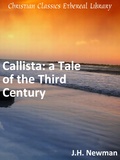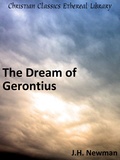John Henry Newman
Tractarian leader and later Cardinal
Biography
Born in London, raised with Bible religion, Newman experienced conversion at fifteen: luminous awareness of himself and God, impressions of creed and dogma, calling to single life. He studied classics and mathematics at Trinity College, Oxford, there developing his evangelical beliefs along Calvinist lines. Ordained an Anglican priest, he became vicar of the university church, St. Mary the Virgin. Fellow and tutor of Oriel College, Oxford, he was influenced by rationalist scholars whose methods included logic and evidences to prove religious matters. Patristic studies, Joseph Butler's Analogy of Religion, friendships, illness, his sister's death, gradually separated him from the liberal leanings of Oriel, centering him in high church or Anglo-Catholic tradition. In 1832 he published his first book, The Arians of the Fourth Century, and, on a Mediterranean voyage, wrote many religious poems (Lyra Apostolica). Recovered from grave illness in Sicily, he returned to England to become leader of the Oxford Movement.
From 1833 to 1841, Newman prolifically defended the Via Media of the Anglican church. The far reaching Tracts for the Times against Popery and Dissent were complemented by his legendary Parochial and Plain Sermons delivered at St. Mary's. He published Lectures on the Prophetical Office viewed relatively to Romanism and Popular Protestantism, and became editor of the Movement's journal, The British Critic. His and the Movement's last Tract, number ninety, proposing a Catholic reading of the “Thirty-nine Articles,” was denounced by church and university. The effect of this blow, other disappointments and doubts, further study of the early church, resulted in resignation from his position and clerical status. After years of intellectual and spiritual struggle, Newman became a Catholic in 1845 while completing An Essay on the Development of Christian Doctrine, which showed continuity from the church of antiquity to the Catholic church of the nineteenth century.
Newman went to Rome to study theology for Catholic priesthood, entered and brought to England the Oratory of St. Philip Neri, published two novels of conversion, Loss and Gain (1848) and Callista (1855), and two volumes on ecumenical relations in England, Lectures on Certain Difficulties felt by Anglicans in submitting to the Catholic Church (1850), and Lectures on the Present Position of Catholics in England (1851).
From 1851 to 1858, Newman founded and presided over the Catholic University of Ireland, justifying Catholic liberal education in the now classic Idea of a University. In 1859 he founded the Birmingham Oratory School for boys, became editor of the Rambler, published a defense of the laity, On Consulting the Faithful in Matters of Doctrine(1859), was reported to Rome for it and asked to resign the editorship.
After four years of relative silence, Newman was aroused by Charles Kingsley's published accusation that Newman and the Roman clergy were indifferent to truth and cultivated deception. Newman responded with the Apologia pro Vita Sua (1864), disclosing the history of his religious opinions from childhood, defending both reason and authority with rhetorical magnificence. Enthusiastic response from Anglicans and Catholics reinstated Newman in the public mind. In 1865 he published The Dream of Gerontius, a long poem about immediate life after death, and Letter to Pusey on Marian devotion. His most philosophical work, An Essay in Aid of a Grammar of Assent (1870), aimed at justifying religious faith by describing how ordinary minds think, assent, and reach certitude.
Newman declined the invitation by bishops and Pope to serve as theological consultant for the First Vatican Council. As Catholic, he had always believed in papal infallibility, but opposed its conciliar definition saying the Church was not yet ready and episcopal intrigue too dominant. Newman accepted the definition of 1870, pleased with its moderation. His Letter to the Duke of Norfolk (1875) defended both the doctrine and Catholic conscience in Anglican England. His last major contribution to ecclesiology was the 1877 Preface to The Prophetical Office, now retitled The Via Media, in which he detailed the Church's three offices and their interrelations: the prophetic, exercised by theologians; the priestly, by laity; the governing, by pope and magisterium.
In 1878 Newman became first honorary fellow of Trinity College, Oxford. In 1879 Pope Leo XIII made him cardinal and, in accepting, Newman singled out as his lifelong work the battle against liberalism, the usurpations of reason in matters of religion. His cardinalate motto was “Cor ad cor loquitur” (Heart speaks to heart). After physical decline, Newman died in 1890. The inscription on his grave at Rednal reads: “Ex umbris et imaginibus in veritatem” (Out of shadows and images into truth).




